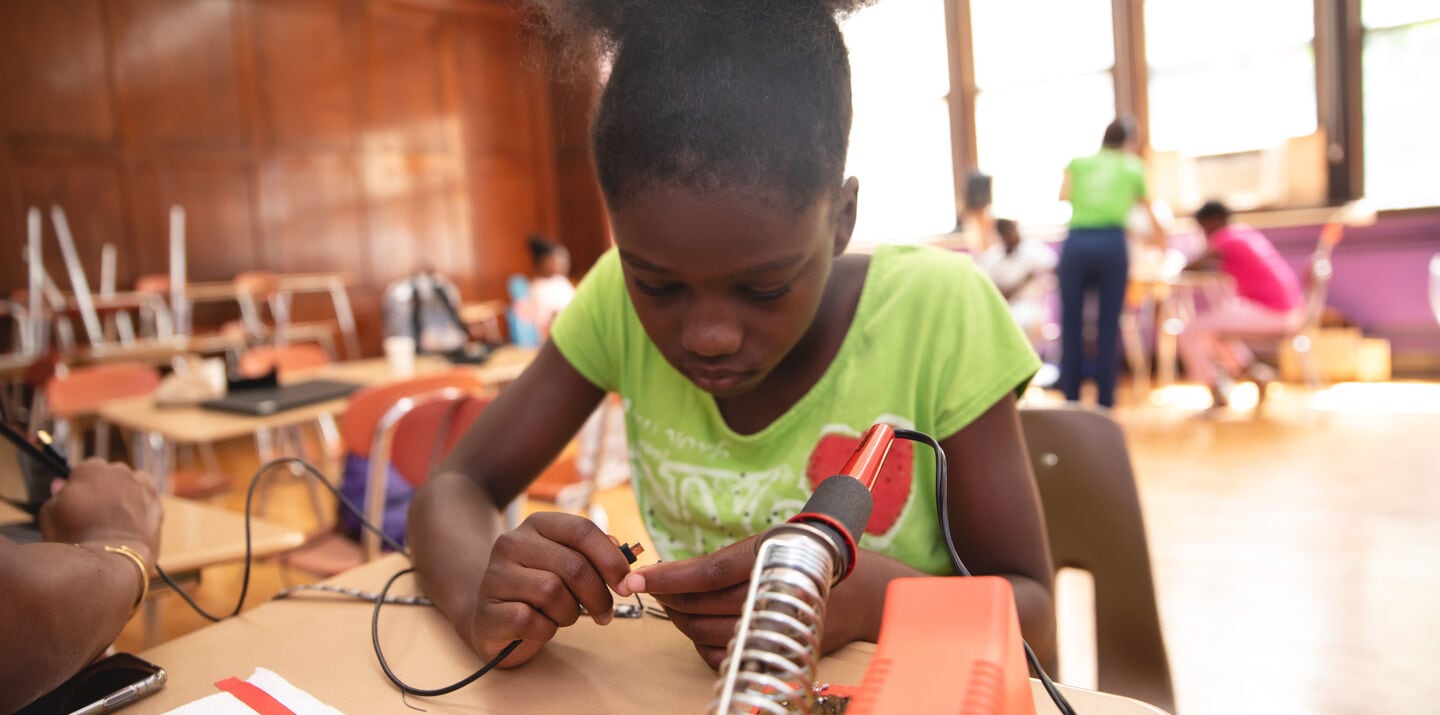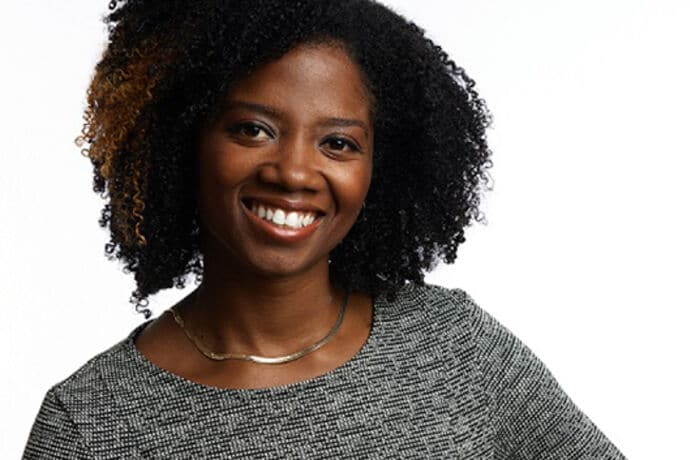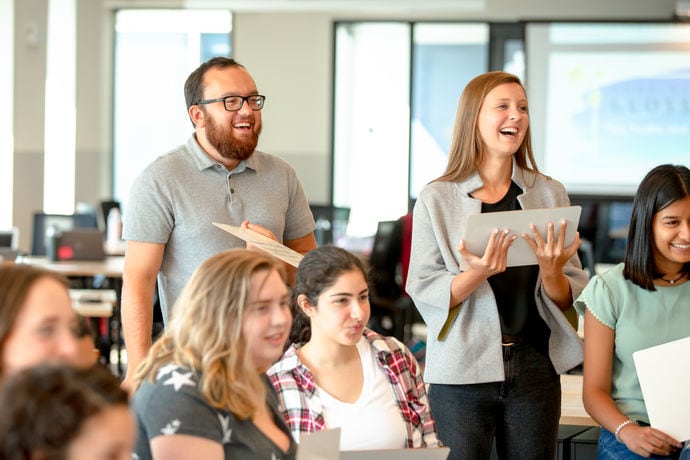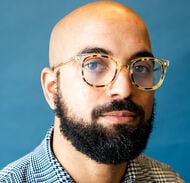
STEMming the Gender Gap
These Teach For America alumni are encouraging girls to pursue STEM careers in innovative ways.
In classrooms around the country, girls are frequently told that women can lead in science, technology, engineering and math (STEM). However, not nearly enough female students are exposed to role models in STEM who look like them.
It’s hard to be what you can’t see. Women make up just 28 percent of the STEM workforce. Black and Latina women are even more underrepresented in the field, occupying only four percent of the STEM workforce. Fortunately, women in STEM are fighting to change that.
Yamilée Toussaint Beach (New York ‘08) and Abby Slovick (Greater New Orleans ‘16) are two Teach For America alumni who have devoted their careers to increasing the female leadership pipeline in STEM. By engaging in the interests of their female students and building safe spaces centered around a shared love of technology, they’re helping girls see that they don’t just belong in STEM—they’re needed in it.
Building a STEM Sisterhood Through Dance
Yamilée never imagined a world where she couldn’t be in science. Growing up with a father, mother, and older brother who all worked in science and engineering, Yamilée was encouraged to see STEM as a career path for herself.

While she was studying mechanical engineering at the Massachusetts Institute of Technology (MIT), Yamilée found herself drawn to Teach For America because she noticed how few women of color were enrolled at MIT—especially in her major. She wanted to understand how young girls become dissuaded from STEM during K-12.
It was during her time at her placement school in the East New York neighborhood of Brooklyn when Yamilée first came up with the idea of combining dance and STEM. Dance has always played a role in Yamilée’s life, and gave her a great sense of community growing up. “What you get from dance is being able to express, being able to connect with other people through that sense of possibility,” she explains. “I wondered: ‘Is there a way that could be true for a STEM space as well, and how can we create that?’”
What began as a “scrappy pilot” consisting of dance lessons followed by math homework became a full-fledged STEM enrichment program for girls. Today, Yamilée is the founder and CEO of STEM From Dance, a nonprofit that is empowering girls from underrepresented backgrounds to become the next generation of STEM leaders through dance.
STEM From Dance: Girls Rise Up
Today, STEM From Dance has residencies in schools, as well as a signature summer experience called Girls Rise Up. Girls Rise Up is a three-week summer experience in which girls learn how to design, build, and code technological projects that complement choreography that they create. Thanks to Yamilée’s program, hundreds of girls who had never coded before are now invested in STEM.
“We have stories where those girls come into the room to dance never having coded before, and after the experience there is an appetite for more,” she explains. “These are girls who otherwise aren’t signing up for the robotics club or the coding club at their school. It is just the whole simplicity of using what they already love to get them interested in STEM.”
This year, Yamilée was chosen as an ambassador for the “IF/THEN Initiative” in recognition of her impact through STEM From Dance. The IF/THEN Initiative—which was developed by Lyda Hill Philanthropies, a philanthropic partner of Teach For America—is focused on empowering the next generation of STEM pioneers through an ambassador program that brings together 125 women leaders in STEM to be role models for middle school girls.
She hopes by participating in the ambassadorship, she will help girls see a new image of what a scientist can look like.
“Often, we see the same images in the media, in stores, in schools, and in labs, of what it looks like to be a scientist.” Yamilée says. “Through the IF/THEN Initiative, the hope is that girls can see new images posted in their classroom. They can turn on the TV and see a woman engineer speaking about what they do, and be inspired to follow in the footsteps of some of these women.”
Creating Confidence by Coding
Abby Slovick always loved numbers, but her true passion for making STEM more accessible for students developed during her time as a teacher. This discovery would eventually lead Abby to dedicate her post-graduate career to studying the impact of STEM on students.
Abby joined Teach For America in 2016, teaching algebra, geometry, and remedial math at a high school in the Louisiana Delta, at the tip of Northeast Louisiana.
It was during this time when Abby’s principal and vice principal sent her to New Orleans for a tech conference, where she attended sessions hosted by code.org and Apple designed to teach educators how to bring coding technology in the classroom. “I went to the two sessions, and realized, "Oh, this is really accessible for my students,’” Abby explains.
She began by teaching coding to her students after their exams. Within weeks, the idea truly took off with her students: “By the second semester, I had a classroom full every Wednesday night after school because so many kids were like, “I want to learn this.”
Seeing her students engage with the coding material had a huge impact on Abby’s future career path. Today, she is a graduate student at Teachers College, Columbia University, where she studies education policy and the impact of STEM on students. She remains connected to the classroom during her summers, when she works at Kode With Klossy as an instructor.
Kode With Klossy is a free two-week summer camp for young women aged 13-18 that empowers girls to learn code and become leaders in technology. Through a partnership between Kode With Klossy and Teach For America, alumni with STEM experience such as Abby are given the opportunity to train in Kode With Klossy's custom curriculum and work as instructors for Kode With Klossy participants, who are known as “scholars.”

“We really open up the classroom to allow our scholars to be creative and to use that side of themselves and their identity to create various web applications that they're interested in,” Abby explains.
The scholars are also encouraged to bond and build a sisterhood around their shared interests through fun activities and games interspersed between the coding sessions.
“I know that there are numerous Kode with Klossy teams performing or participating in hackathons, even at the national level,” Abby says. “Just creating that bond so that once camp is over our scholars have the opportunity to connect and to stay partners in their tech journey and their STEM journey.”
Abby’s scholars created apps addressing the issues and needs they cared most about and that were most relevant for their lives: apps about environmentalism, reproductive rights, STEM mentorship, gun violence, and apps designed especially for women and non-binary individuals.
“I realized that if these individuals are our future, our future has a lot of potential. Our future is thinking very critically about what is impacting not just themselves, but America and the world as a whole,” Abby says.
The Future of Female Leadership in STEM
Yamilée and Abby both feel that this work is essential to the future of STEM. Without greater representation of women—and especially women of color—in the field, innovation will stagnate.
“What keeps me motivated to do this work is the thought that an idea that could impact all of our lives within these girls,” Yamilée says. “That if we don't tap into their potential, if we don't inspire them to think about what's possible, we could miss out on technology that impacts our daily life or solutions to pressing world issues.”
Unlocking the perspectives of women, and especially women of color, can lead to inventions that can make the world a better place for everyone.
“I think it can really transform the conversation, and it can really transform the product. Women see things differently,” Abby says. “We experience things differently. Individuals of color experience things differently. By incorporating these individuals into the conversation, we can build a better field of STEM.”
Sign up to receive articles like this in your inbox!
Thanks for signing up!
Content is loading...









